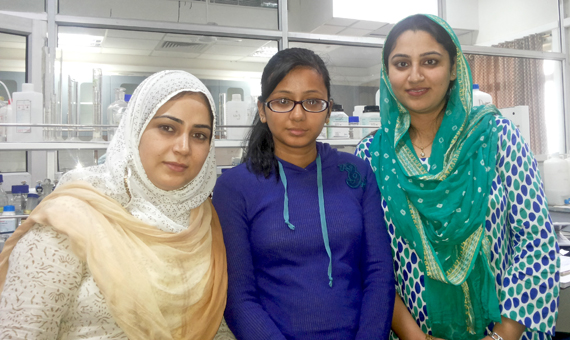
New Delhi, Dec 23: Asma Naseem began her primary education in 1990 in a small village in Baghpat district of Uttar Pradesh. Six months after she started going to her two-room school, her family decided that she deserved a better education. Her father then shifted, with four-year-old Asma, to Delhi.
The little girl was admitted to the primary school in Jamia Millia Islamia, and her father found work in the city. The girl's mother joined them four years later.
Asma finished school, then graduated in biotechnology from Jamia's Faculty of Natural Sciences, and won the gold medal in the post-graduation class of biosciences at Jamia. She then researched protein conformational diseases at Jamia, and is now pursuing post-doctoral studies at the International Centre for Genetic Engineering and Biotechnology (ICGEB) in Italy.
Just like Asma, Samreen Jahaan joined the mechanical engineering course at Jamia Polytechnic after school. She is the only woman student in the first-year batch of the course. But being the lone girl in her class is not something Samreen makes much of: "If boys can, why can't girls?" she asks.
"Initially I hesitated in sitting in an all-boys' class, but now I don't mind. The boys help me in all the subjects," Asma told IANS, expressing happiness that her parents support her in her career decision.
Zainab Zafar, a first-year student of the Bachelor of Physiotherapy course at Jamia, has joined this paramedical field with the aim of treating patients. In a course where numerous girl students had withdrawn their names in the initial batches because lab work requires physical touch with "models" of the other sex, Zainab and her fellow girl students are confident that they are doing noble work.
"Our parents are today comfortable with what we are learning. After all, it's a noble job. I will be treating someone," says Zainab.
Nor does she feel that the burqa that she wears could prove a hindrance at the time of recruitment. "Recruiters will see my potential," Zainab said, exuding confidence.
Asma, Samreen and Zainab represent the brave new face of Muslim girls, confident of their skills, competitive in spirit and hungry for success. Irrespective of their geographical distance or social situation, Muslim girls are converging at Jamia Millia Islamia, the 92-year-old central university in New Delhi, because of its stimulating academic environment, the safety if offers women, and the religious and cultural ethos at this central university.
Shaila Naaz, a student of architecture from Daltonganj in Jharkhand, says: "Getting admission in a central university is an achievement. And Jamia provides an ideal atmosphere for studies. It's safe too, there's abundant security." Polytechnic student Ayesha Ghayas says she chose Jamia for a degree in computer engineering because it's a Muslim university, with no ragging.
Jamia, on its part, follows a proactive policy to promote girls' education. The 10 percent reservation for women at the university is showing results. In Jamia Polytechnic, for example, of 900 students, 92 are women. While women students traditionally chose courses in humanities, languages and education, today there is enough competition even in courses like physiotherapy.
Ejaz Hussain, director of the Centre for Physiotherapy and Rehabilitation Sciences at Jamia, says that in the first two years of its existence since 2007, the centre had to counsel parents to admit their daughters to the course. These days, the men:women ratio is 70:30.
Jamia is also building more women's hostels. A new hostel for women was recently inaugurated by Lok Sabha Speaker Meira Kumar, taking the capacity to have women living on campus from 500 to 750. With the University Grants Commission grant of Rs.26 crore at the behest of United Progressive Alliance chairperson Sonia Gandhi, the university is set to add 400 more hostel seats for girls.
A zero-tolerance policy on sexual harassment helps too. The earlier University Complaints Committee has been replaced with an Internal Committee to Deal with Sexual Harassment of Women at Workplace. While women staff and the administration are covered under the Sexual Harassment of Women at Workplace (Prevention, Prohibition and Redressal) Act, 2013, for students the university has its own ordinance.
There are complaint boxes at different points on campus, and any complaint dropped into the box is taken up for action. Bulbul Dhar James, director of Sarojini Naidu Centre for Women's Studies at Jamia, is a member of the committee and says women are now picking up courage to lodge complaints.
Sarojini Naidu Centre also teaches men students the right conduct in a multi-cultural milieu. This is especially important because students come from villages, where codes of conduct may be vastly different, and their backgrounds may also create inhibitions and diffidence.
Sabiha Hussain, faculty member at the Centre for Dalit and Minorities Studies in the university, says a sea change has occurred in the attitude of students in the last few years.
"Parents are now open to sending their daughter to Delhi for courses like computer science, biotechnology, physiotherapy and polytechnic. They have high aspirations for daughters, and hope their daughters will get better exposure here," Hussain said.










Comments
Add new comment